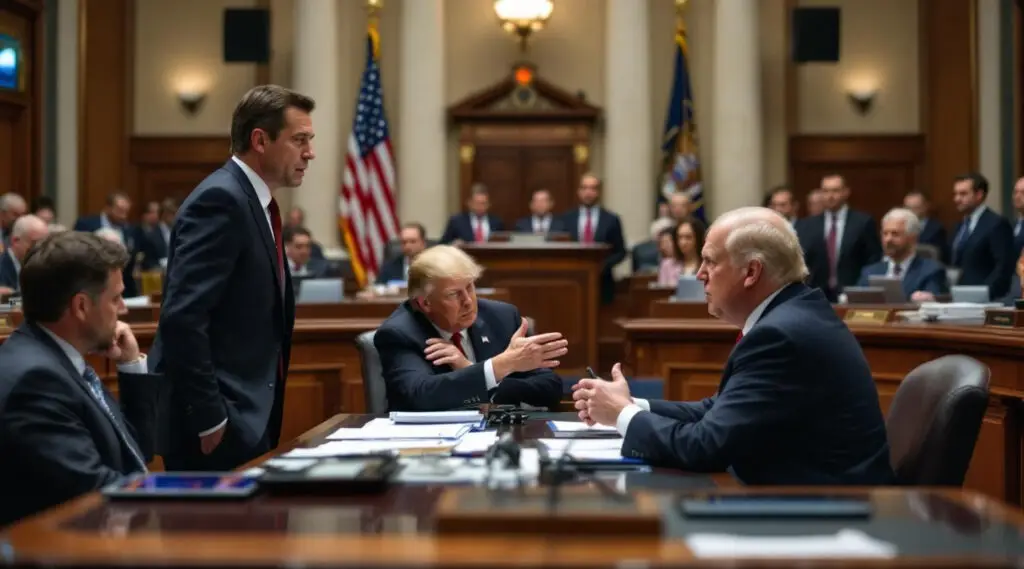Democrats Oppose GOP Crypto Bills Tied to Trump
Democrats have launched an aggressive campaign against Republican-backed crypto legislation, warning that the bills could weaken regulatory oversight and empower questionable digital asset practices. U.S. Representatives Stephen Lynch and Maxine Waters publicly criticized three bills—the CLARITY Act, GENIUS Act, and a CBDC ban—calling them dangerous to financial stability and investor protection.
The lawmakers announced their “Anti-Crypto Corruption Week,” a coordinated strike aimed at highlighting what they say are ethical and national security concerns embedded in the proposals. They believe the bills could open financial backdoors for former President Donald Trump and normalize risky crypto behaviors.
Trump Crypto Ties Raise Oversight Concerns
Representative Maxine Waters linked the legislation to Trump’s alleged financial misconduct, accusing Republicans of rushing legislation that could benefit his digital assets initiatives. She warned that the measures would shift power toward unregulated crypto operators and erode traditional regulatory frameworks.
Stephen Lynch, who serves on the Subcommittee on Digital Assets, added that the proposals make Congress look complicit in what he calls Trump’s “unprecedented crypto scam.” Both lawmakers argued that foreign interference risks could increase if these bills become law.
Republican Lawmakers Fast-Track Pro-Crypto Agenda
Republicans are pushing to quickly pass the crypto-friendly bills through the House, positioning them as essential for promoting innovation and resisting regulatory overreach. Supporters argue that the legislation would provide clarity for digital assets and help the U.S. remain competitive in the evolving blockchain space.
The GENIUS Act, already approved by the Senate, is a stablecoin regulatory framework expected to see a vote in the House. Paired with the CLARITY Act and the CBDC ban, these measures represent the most significant attempt yet to reshape crypto rules at the federal level.
Democrats Plan Hearings and New Crypto Oversight Bills
In response, House Democrats plan to escalate their resistance with committee hearings, procedural challenges, and the reintroduction of the STOP Trump in Crypto Act. They hope to stall momentum on the Republican-led crypto push while rallying public support against deregulation.
Their messaging is clear: fast-tracking crypto legislation could empower politically connected players and damage retail investor protections. They aim to use the upcoming week to sway undecided lawmakers and educate voters about the implications.
Market Experts Warn of Reduced Investor Protections
Financial experts and industry analysts are weighing in on the implications of the bills. Many warn that loosening restrictions could lead to a rise in unregulated crypto schemes and reduce accountability for digital asset platforms.
Concerns are especially high around the lack of clear compliance measures for stablecoins and market structure. Analysts say such gaps could lead to increased fraud, volatility, and exploitation of retail investors.
Trump’s Digital Asset Push Under Increased Scrutiny
The controversy also reignites scrutiny around Trump’s own involvement in the crypto industry. His support for stablecoins and digital asset initiatives—like his family’s USD1 token—adds another layer of complexity to the debate. Critics argue that these bills are designed to legitimize his ventures and give him a market edge.
Trump’s influence on current SEC and regulatory policy is also a growing concern. Democrats fear that aligning crypto deregulation with Trump’s financial interests could set a dangerous precedent.
Crypto Lobbying Influence Raises Ethical Questions
The ongoing clash in Congress highlights the growing influence of crypto lobbying. Both parties have received donations from industry players, but Democrats claim Republicans are letting those interests dictate policy.
With the crypto lobby reportedly backing the bills, watchdog groups warn of potential conflicts of interest. They argue that regulatory standards should be driven by public interest, not private profits.
Future of US Crypto Legislation Hangs in the Balance
As the week of political showdowns unfolds, the fate of U.S. crypto regulation hangs in the balance. Lawmakers must decide whether to support sweeping changes that could redefine the industry—or push for tighter control and accountability.
Whatever the outcome, one thing is clear: the battle over digital assets is no longer just a tech debate—it’s a political power struggle with national implications.























